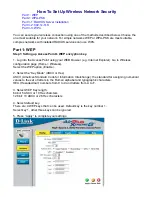
Advanced Configuration
Figure 4-9
Management Services Configuration Screen
HTTPS Access (Secure Socket Layer)
The user can access the AP in a secure fashion using Secure Socket Layer (SSL) over port 443. The AP supports
SSLv3 with a 128-bit encryption certificate maintained by the AP for secure communications between the AP and the
HTTP client. All communications are encrypted using the server and the client-side certificate. The AP comes
pre-installed with all required SSL files: default certificate and private key installed.
Configuring Secure Socket Layer (SSL)
After enabling SSL, the only configurable parameter is the SSL passphrase.
If you decide to upload a new certificate and private key (using TFTP or HTTP File Transfer), you need to change the
SSL Certificate Passphrase for the new SSL files.
•
Enable HTTPS (Secure Web):
Check this box to enable SSL on the AP.
NOTE
You need to reboot the AP after enabling or disabling SSL for the changes to take effect.
•
SSL Certificate Passphrase:
Specifies the SSL Passphrase to use if Enable HTTPS has been checked. The user
must change the SSL passphrase when uploading a new certificate/private key pair, which will have a
corresponding passphrase.
Accessing the AP through the HTTPS interface
The user should use a SSL intelligent browser to access the AP through the HTTPS interface. After configuring SSL,
access the AP using
https://
followed by the AP’s management IP address.
4-19
















































